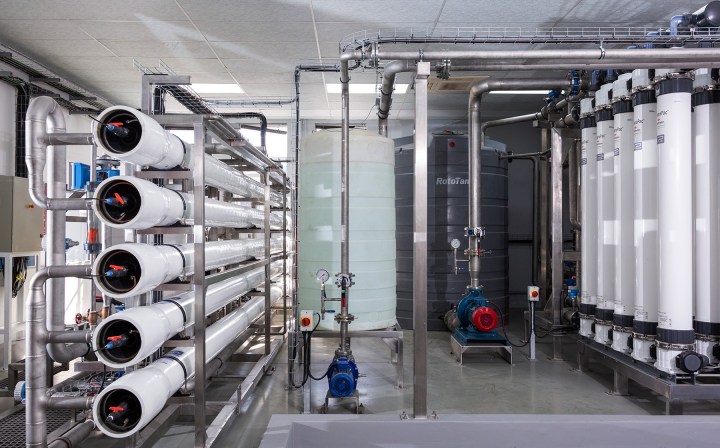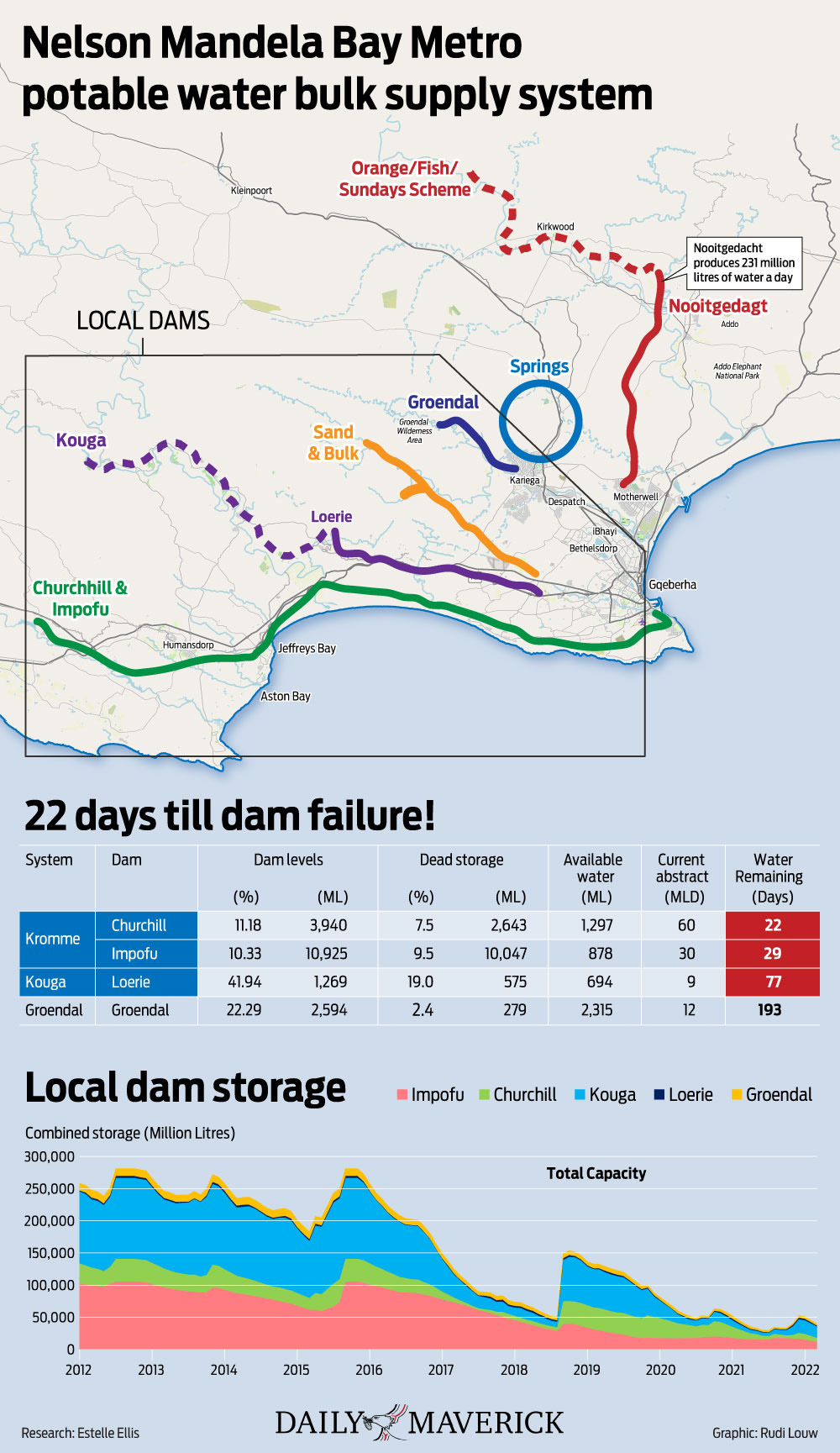22: COUNTDOWN TO CATASTROPHE
Nelson Mandela Bay Business Chamber calls for unity, hits out at political instability as Day Zero draws closer

A lack of planning, the devastating impact of ongoing political instability and the fragility of the current water supply system have been highlighted by the Nelson Mandela Bay Business Chamber as major concerns as the city nears Day Zero when its supply dams will run dry.
Citing a lack of planning, the consequences of ongoing political instability and the metro’s inadequate response to the water crisis, Prince Matonsi, the chief operations officer of the Nelson Mandela Bay Business Chamber, has called on all sectors in the community to form a united front and fight the potential disaster that will be Day Zero.
On Tuesday, it was estimated that the metro’s supply dams had 22 days of water left, following more inflow into dams after rain over the weekend.

(Graphic: Rudi Louw)
But the latest figures from the Department of Water and Sanitation, released on Tuesday, showed that the rain in fact only kept the water levels somewhat constant. The Impofu Dam was 10.3% full after it was at 10.5% last week. The Kouga Dam remained constant at 12.8%.
Businesses consume 35% of the metro’s water allocation, while residents consume 65%.
“Businesses, in particular, have done a lot over the past few years and, in particular, the last few months to reduce their water consumption levels through the adoption of rainwater harvesting, recycling, water restrictors and other initiatives.
Weekend rains weren’t enough to stave off Day Zero in Nelson Mandela Bay in just three weeks
“In fact, a number of industrial and commercial businesses in Nelson Mandela Bay have undertaken significant investments to reduce and conserve water. This on its own has not been enough and overall water consumption levels in the metro have not come down. Daily consumption levels of the metro as a whole have been tracking at 280 megalitres per day, but this needs to be reduced to 230 megalitres per day,” Matonsi said.
“The only way to prevent taps from running dry is for the municipality to quickly reduce water losses under their control, and for all consumers (residents and businesses), regardless of whether they are located in the affected zones or not, to step up their water saving efforts.
“All stakeholders need to unite around the goal of preventing more than a third of the metro from entering a water and sanitation crisis.”
According to the metro’s latest statistics, there were 3,257 water leaks that needed to be fixed by the end of last week (17 May).
The Crisis: Water Armageddon loading as Day Zero looms for Nelson Mandela Bay
Matonsi said that if more than a third of the metro did not have water, this could cause a humanitarian crisis for communities and the closure of businesses.
“As organised business, we are extremely concerned about the potentially devastating impact which the water crisis may have on Nelson Mandela Bay’s economy and its communities.
“This issue has been flagged for some time, but there has been an inadequate response due to the ongoing instability issues facing city council and the resultant impact of this on the municipality’s ability to deliver basic services.
“The protracted delay in council passing the amended budget and unlocking the required funding to deal with water infrastructure issues is one example of how political instability is affecting the water crisis.
“While we acknowledge that the lack of rain and resultant low dam levels have been one of the factors contributing to the water crisis, there are a number of other issues which have further exacerbated the situation. The recent Nooitgedacht Phase 3 project completion milestone is not the ‘silver bullet’ everyone thinks it is. This has a limited capacity in terms of what can be supplied to the metro and current consumption requirements exceed this.
“Also, reticulating water from the Nooitgedacht scheme throughout the municipal areas is wholly reliant on pump station operations. However, the low dam levels have pushed operations to their limits, where standby pumps are in use as duty pumps.
“Frequent pump station failures have been the norm since December 2021. Due to constraints at local dams, the metro has not been able to balance the system by increasing supply from available sources, as it has in the past. This has resulted in frequent mechanical and electrical breakdowns in the water supply.
“Urgent refurbishment work is required at some of the critical pump stations, and procurement efforts must be intensified. It is critical that the dam capacity be stretched to the end of July, when the KwaNobuhle pump station will be able to pump Nooitgedacht water to KwaNobuhle and other areas served by western suburbs.
“Vandalism of water pump station infrastructure has, over the past few months, resulted in frequent water outages across various parts of the metro.
The People: Battle to save water last straw for Nelson Mandela Bay’s residents
“The municipality’s financials for the 2020/21 period indicate that non-revenue water losses in the metro amounted to 40%. This is a slight improvement from the prior year, where non-revenue water losses stood at 43%. Of the 40% of water losses, 29% were leaks, while the other 11% comprised commercial losses, which include unauthorised consumption of theft or illegal use, plus inaccuracies associated with customer metering.
“The water losses require urgent attention from the municipality and there needs to be visibility around the actions being taken to rein this in. In particular, the municipality needs to reprioritise its activities to ensure that sufficient budget and resources are urgently allocated to undertake critical maintenance work and fix the [roughly] 3,000 water leaks around the metro.
“Additionally, enforcement of municipal regulations and bylaws are required to prevent people from the unauthorised selling of municipal and borehole water, topping up swimming pools and bypassing their water meters. The vandalism of municipal infrastructure and, in particular, water substation infrastructure, needs to be addressed by the relevant authorities.
“Longer-term, we need to recognise that we live in a water-scarce area and that this requires that consumers adopt permanent water preservation measures and that the municipality undertakes adequate planning and budgeting to ensure the maintenance of water and sanitation infrastructure takes place regularly.”
Matonsi said the Business Chamber’s Adopt a School initiative had seen member businesses adopt 41 schools to address water leaks, install water tanks and drill boreholes as part of a concerted effort to more broadly address water losses in the metro.
“We launched this initiative just over a year ago after it was identified that schools accounted for 10% of the total water lost to leaks in the metro.”
One of the cornerstone businesses in the Nelson Mandela Bay economy, Volkswagen (VWSA), had introduced extensive wastewater recycling as part of its water conservation efforts.
Volkswagen spokesperson Andile Dlamini confirmed that the company had been warned of the probability of prolonged water outages once the dams run dry.
“Our factory has constructed a wastewater recycling facility which will recycle wastewater from various areas of the factory. The water will be treated to be reused in certain production processes.”
He said the company had managed to reduce its water consumption by 19.4% since 2019, and if compared to 2010, by 63%. He said they were also set up to harvest rainwater in various areas of the factory.
Dlamini said that at this stage they did not foresee that the water crisis will lead to job losses and their hope was that their mitigation measures would be sufficient to address possible water shortages when the dams run dry.
The company is also a partner in the Adopt a School initiative and has installed 30 water tanks at 15 schools in KwaNobuhle and Despatch. With support from Old Mutual, VWSA has supplied and installed two 5,000-litre tanks for each of the schools, which were filled with water by the end of August last year.
The company has helped with plumbing repairs and upgrades of the ablution facilities at the five schools – Ntlemeza Primary, James Ntungwana Primary, Vuba Primary, Noninzi Luzipho Primary and Mngcunube Primary – where its literacy centres are based. These repairs included fixing water leaks, replacing taps, basins and toilet seats, and deep cleaning. DM/MC
[hearken id=”daily-maverick/9472″]


















 Become an Insider
Become an Insider
Comments - Please login in order to comment.